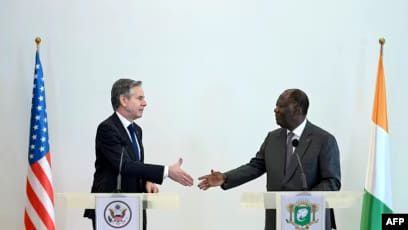Africa
Blinken reaffirms US dedication to enhancing partnerships with Africa

U.S. Secretary of State Antony Blinken emphasized the United States’ commitment to strengthening partnerships with African countries and acknowledged their increasing role in addressing global issues.
Following discussions with Ivory Coast President Alassane Ouattara, Blinken highlighted the importance of expanding commercial ties to foster economic growth and job creation in both countries.
Additionally, he emphasized the significance of investing in public health initiatives and addressing regional security challenges. Blinken expressed satisfaction with the growing bond between the United States and Ivory Coast.
His visit to Ivory Coast is seen as a reflection of U.S. interests in the country’s stability and its preparations for the upcoming presidential election in 2025. Given the recent coups in neighboring countries, such as Mali, Burkina Faso, Guinea, and Niger, the United States and the international community are concerned about stability in the Sahel sub-region of West Africa.
To support efforts in preventing conflict and promoting stability, the United States announced $45 million in new funding for Ivory Coast and its neighboring countries.
This contribution brings the total U.S. stability-focused assistance in Coastal West Africa to nearly $300 million since 2022. Following his visit to Ivory Coast, Blinken will travel to Nigeria to hold talks with Nigerian President Bola Tinubu and Foreign Minister Yusuf Maitama Tuggar in Abuja.
According to American officials, although the United States is open to countries diversifying their partnerships, aligning with nations such as Russia could pose challenges.
They specifically highlight the situation in Mali, where the involvement of Russian paramilitary Wagner Group has resulted in increasing civilian casualties and security concerns, compounded by France’s withdrawal.
The recent French military withdrawal from the Sahel region and the conclusion of the U.N. peacekeeping mission in Mali have further raised apprehensions regarding regional security. On a different note, Nigeria holds the distinction of being the largest country in sub-Saharan Africa in terms of both population and economy.
It also wields significant political, economic, and military influence within the Economic Community of West African States (ECOWAS).
The United States, being the largest foreign investor in Nigeria, maintains a substantial security partnership with the country, particularly in counterterrorism efforts against Boko Haram and ISIS-West Africa.
